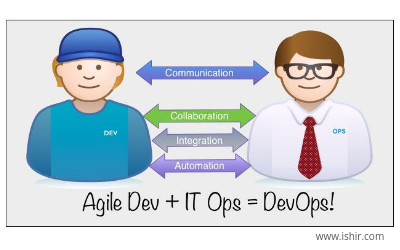Whenever am asked to comment about Agile Software Development or DevOps, I always say that they are a power couple (it’s like they’re married for the better). In fact, whoever adopts them in combination, be it software testers, software developers or delivery ops are bound to reap the benefits. “Faster”, “Cheaper” and “Better” are no longer buzz words. Going by the trend, Agile DevOps seems to be the only approach, that can make faster, cheaper and better possible.
I once read this definition of Agile and it kind of stayed with me – “Agile is more a “direction,” than an “end,” a philosophy and mindset at board level.” By Pearl Zhu, who’s a digital visionary and author of the famous book Digitizing Boardroom, The Multifaceted Aspects of Digital Ready Boards.
And I once heard Jez Humble, CTO for DevOps Research and Assessment LLC, describe it as “DevOps is not a goal, but a never-ending process of continual improvement”. Nothing more fitting as the definition of DevOps.
In an article titled Agile and DevOps: Friends or Foes? where he discusses the relation between Agile and DevOps, Ian Buchanan says, “many people think Agile means Scrum and DevOps means Continuous Delivery. This oversimplification creates an unnecessary tension between Agile and DevOps so you may be surprised to find that they are best friends!”
He further adds that both Agile and DevOps emphasize business value and a culture change and that is where they connect strongly. While Agile is always perceived as a response to the negative impact of the good ol’ waterfall approach, DevOps, on the other hand, has never been perceived as a response to Agile. There are Enterprises, that have used both agile and DevOps in combination and say that when used together, Agile and DevOps help to increase productivity and sales.
History of Agile and DevOps
Agile denotes an umbrella term, which simply emphasizes following an iterative development. With Agile, frequent delivery cycles, collaboration, quick response to change, and involvement of key stakeholder so nothing comes as a surprise. There are practices like Scrum, Pair Programming, Scaled Agile Framework, Test-driven development, etc. that help Enterprises to meet the business needs of today.
Agile laid a lot of stress on –
- Software development rather than documentation
- Interactions rather than processes and tools
- Quickly responding to changes
- Collaboration with clients
DevOps, on the other hand, is a business-driven approach to help with solution delivery, and uses agile practices, collaboration and automation.
When Agile methodology was introduced, developers had a huge relief but it had drawbacks. There was lack of proper documentation, project getting off track, and failure to deliver on time. Agile methodology involved testers, developers and designers. DevOps could overcome these limitations and ensured secure, frequent and timely product deliveries. It also ensured that there was communication between marketing, customer service, operations, quality and other teams. In fact, DevOps emphasizes the involvement of the IT Operations team.
The focus areas for DevOps includes the following –
- Design and architecture
- Process Automation
- Continuous integration
- Organization culture
- Deployment and delivery
- Operations and Support
Are DevOps and Agile methodologies different?
There is difference between the two. DevOps is a technical practice while Agile is about processes like Scrum methodology and sprints. DevOps helps to enable cross functional communication (for example teams like QA, development, deployment, infrastructure, etc.) and agile believes in communication between the development team and client. It also emphasizes on inter-team communication with daily scrum calls where the key agenda is to identity the issues and resolve them with the help of agile scrum methodologies.
DevOps uses tools like Docker, Splunk, Jira and Chef that are focused on automating deployment and tracking errors in real-time to quickly fix them. Agile uses tools that are focused on project management and collaboration.
What are the benefits of adopting DevOps Agile for Software Development?
It’s clear that DevOps and Agile are clearly allies. I’m giving you a few pointers to help you understand some obvious advantages.
- Agile becomes more flexible with DevOps
Agile Model is flexible to adopt the changing requirements of the client and ensures that the product works in the test environment. But to get to that stage is a long cycle. With DevOps, the working software reaches the production level in a timely and more smooth way.
- There won’t be any silos with DevOps Agile
Agile helps different business groups to communicate with each other. But there are creating silos within the Agile production environment. With combination of Agile and DevOps, an overarching plan to develop, deliver and update software collectively can be implemented.
- Both the methodologies complement each other
With this point, we’ll just reiterate what we have just discussed. DevOps can take Agile to the next level with increased ease and transition from software to its implementation with the involvement of an operations person.
Trends have repeatedly shown that when Agile and DevOps work together, they give better results. Agile DevOps is a new mindset that is fast turning into a priority for many Enterprises. So, you know why I say they’re married (at least for now).
Are you planning to benefit from their union? Speak to one of our software development experts to understand how you can.




